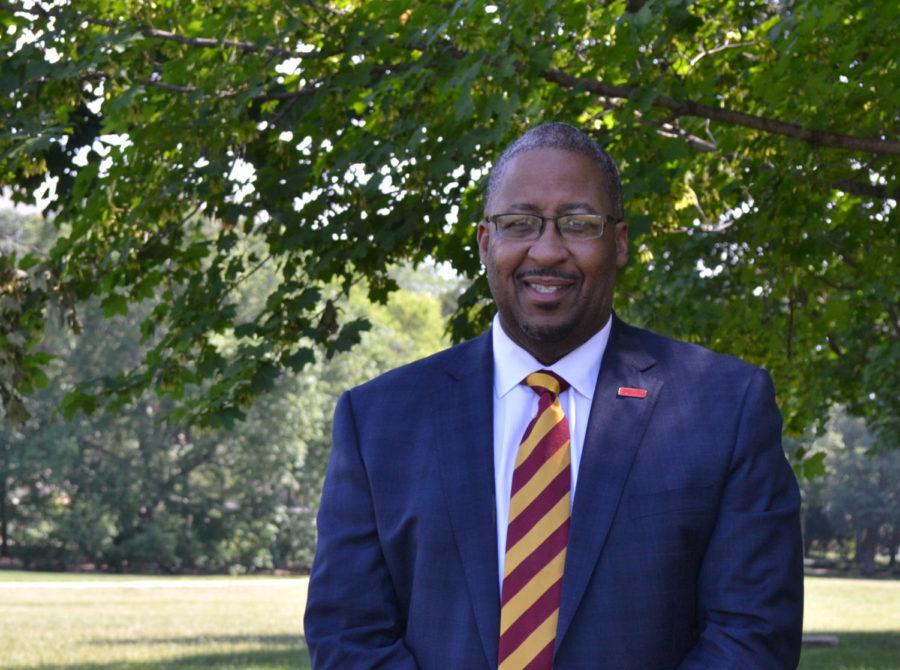Senior VP of student affairs speaks of own experience as first-generation college student
Martino Harmon is the Iowa State vice president of student affairs.
November 8, 2017
Martino Harmon, Iowa State’s senior vice president of student affairs, had to figure out adjusting to college mainly on his own.
He said, his parents helped him get to college by paying to send him on a college tour and encouraging him to go on to higher ed.
Once he went on to study at the University of Toledo, since they had not gone to college, his parents could not offer him the guidance through college without having experienced it themselves.
Harmon said instead they would say, “We pray for you and don’t come home until you finish.”
He, like over 8,000 of Iowa State’s undergraduates, was a first-generation college student.
“You know, that was their message. They didn’t know how to help me other than to say, ‘This is a priority and we want to make sure you have an opportunity.’ So, I have, as many other staff members and faculty on campus, I have a special personal affinity for students who have an experience like I had when I was in college.”
Today is the first National First-Generation College Celebration, sponsored by NASPA, also known as the Student Administrators in Higher Education.
Harmon said while Iowa State offers resources to first-generation college students, he said when he went to college, he doesn’t think they even used the term.
“They didn’t even talk about being a first-generation student. That wasn’t part of the discussion. We didn’t even think about services for first-generation students because the only service that you could connect would be financial aid,” Harmon said.
Harmon said when he was in college, they had a freshman “weed out” mentality.
“They would give you that ‘Look to your right, look to your left. Two people won’t be here next year sort of philosophy,” Harmon said. “This was a long time ago … and I know I sound like the person that says, ‘We walked up hill both ways, barefoot,’ but I don’t even know that there was a good body of research around first-generation students.”
He said the research was just starting in the late 70s, early 80s. So it wasn’t that the universities didn’t care, they just didn’t know the issues facing first-generation students, he said.
Now, he said his daughters had a very different college experience than he did. Since they have parents with multiple degrees they could call them if they had any questions.
Outside of his own personal experience being a first-generation college student, Harmon said as a land-grant institution, Iowa State must help these students.
“First of all, first-generation students are really part of our DNA. Serving them is part of what we do as a land-grant institution providing access,” Harmon said. “So, first-generation students are a part of that access mission since often, when you’re first generation, you sometimes don’t even understand the hurdles and the challenges that you need to get through to even get into college and then once you get to college the challenge is being success because you don’t have anyone behind you sort of coaching you and really explaining this process to you.”
Iowa State offers both academic and financial support to first-generation students who make up about a quarter of the undergraduate students.
One of these resources is offered through a federal TRIO grant that both low-income and first-generation students can apply for.
Each of the approximately 200 students in the program have a mentor who watches over them and their progress. The staff members help these students fill out their FAFSA, connect them to different resources on campus or anything else the students are struggling with.
Harmon said this program was around when he was a student, but it wasn’t well known around campus.
Another resource is the Hixson Opportunity Grant, which is a scholarship program offered to up to 100 Iowans per year.
Students who participate in this program are a part of a learning community and many move up to leadership positions after their first year as mentors. Like the TRIO program, there is a small staff that mentors these students.
The university is also participating in a grant with 10 other universities, which is part of their connection with the University Innovation Alliance.
The 11 universities share their best practices with low-income, first-generation and under-represented students and then collaborate on some larger projects. Each university received grants to implement very detailed advising to 500 2016-2017 freshmen.
Each university will follow these 500 students until their 2020 graduation, and they will compare these students to 500 students who are receiving regular advising.
With this data, Iowa State can see which practices make a difference in student success.







